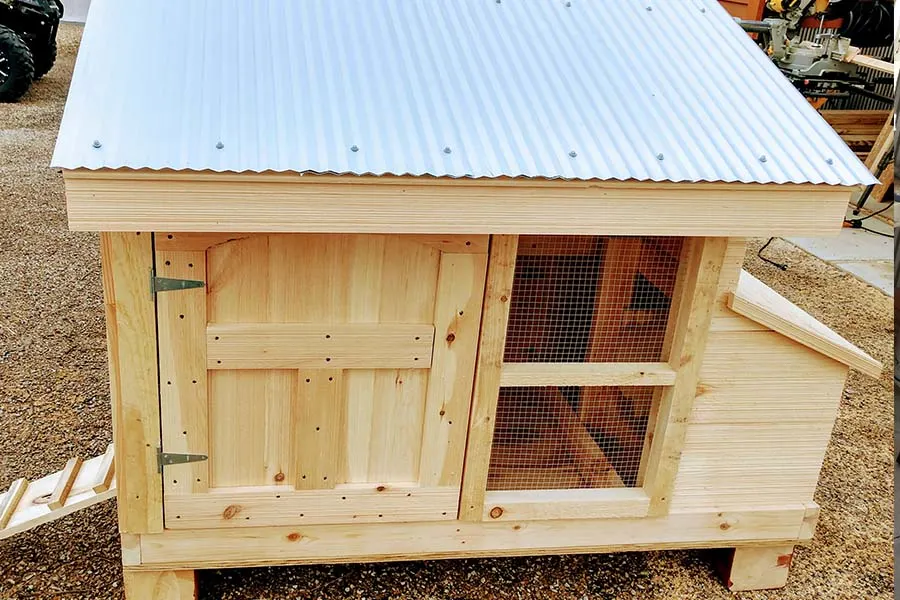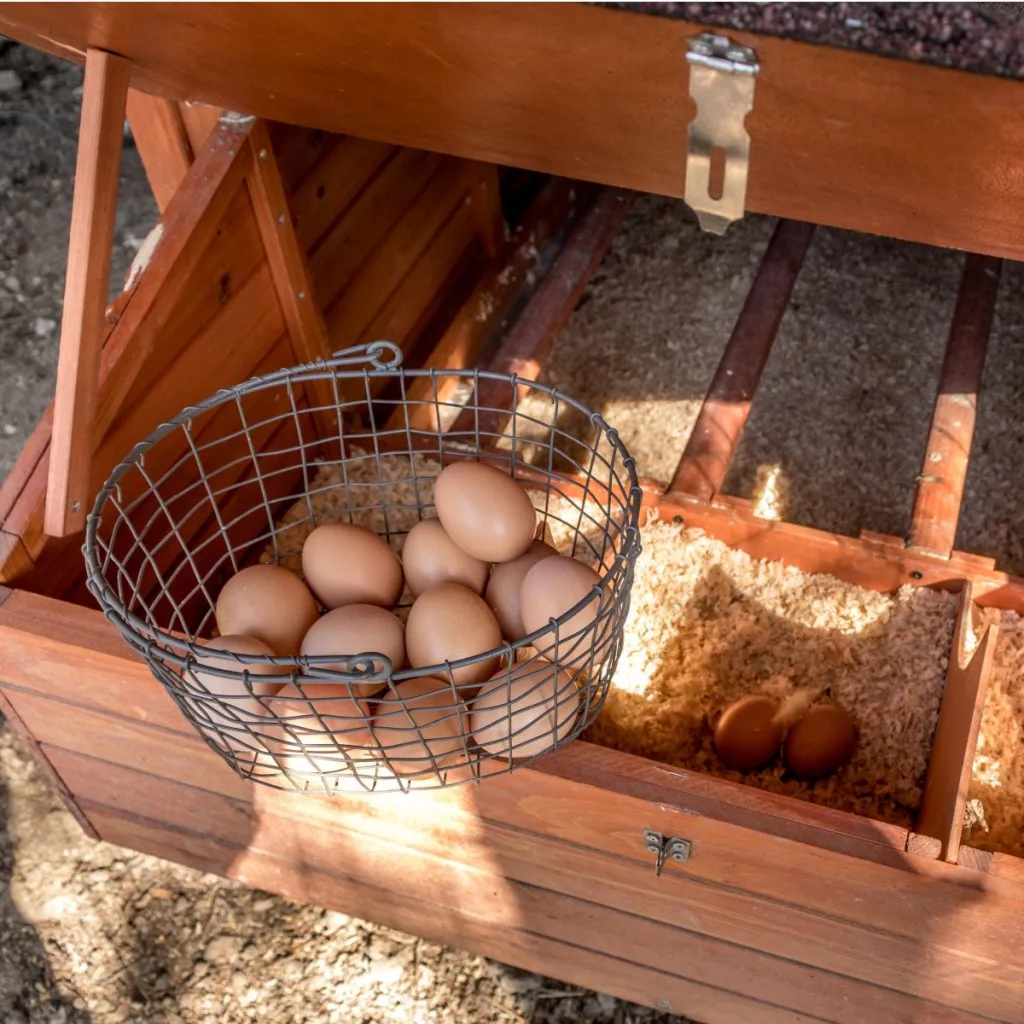Looking for a few secrets and tips for raising your own little flock of backyard chickens?
With the price of eggs going through the roof and then some, more and more people are looking into just what it takes to keep a few chickens of their own in their backyard. So much so, that in the last few weeks, it seems to be the number one topic coming into our inbox!
Is it difficult? Does it take a lot of time and effort? When is the best time to start? And, of course the ever popular question – do I need a rooster to get eggs?

One thing is for sure, raising chickens is both rewarding and beneficial. And for so many great reasons. In addition to supplying incredibly tasty fresh eggs, chickens provide great compost material for your vegetable and flowers. They can also make a serious dent in pest and insect problems.
But perhaps best of all, chickens are actually incredibly fun to be around. Believe it or not, they really do develop their own personalities. And they really are the ultimate all-purpose addition to any home -whether it be in a farm, a backyard in a suburb – or even in the middle of a city!
The Secrets To Raising Backyard Chickens
We have had our own flock of chickens for most of the last 15 years with the exception of the last two years as we built the new farm. The good news is that this year, we will once again have a small flock at the farm to range around in a converted hay wagon chicken coop. See: Creating The Perfect Little Mobile Chicken Coop
We certainly have missed having them around! Even more than the fresh eggs – our chickens have always been a big provider for our garden. Their manure is incredible for powering soil and making great compost.
But chickens also do an amazing job of keeping insect populations under control. In fact, they completely took care of ticks and grubs at our last farm! We will be very happy to have them back. Especially when you consider just how easy it really is to have a few chickens.
The Basics Of Raising A Backyard Flock Of Chickens
In a nutshell, chickens require 4 simple things to stay healthy and happy. First and foremost, they need a safe, secure and dry shelter. They also need food and water – and last but not least, a little space to roam and scratch around.
Most people are surprised to find out just how easy chickens are to care for. On average, it takes us about 5 minutes each day to fill their feeder with food and give them fresh water. And of course, to collect the day’s eggs.
In addition, we usually spend about a half hour every month maintaining the coop. Mainly, clearing out old straw and manure to the compost pile, and putting fresh straw down in the coop.

Although you can purchase older birds, we have always raised our hens from day old chicks. Not only is it a fun and rewarding experience, but it also allows the chickens to get used to you from day one. It also usually results in calmer, more social birds – and certainly ones that develop more personality.
Raising Young Chicks
Raising chicks is actually fairly straightforward and a lot of fun! For the first 8 weeks of their life, chicks need to be kept in a brooder. A brooder is nothing more than a temporary home to keep them safe and warm until they feather out.
It doesn’t have to be fancy or expensive. We made ours from a few scraps of 2 x 4’s and chicken wire for about $10 in materials. A metal stock tank or a large dog kennel will work well too.
We use a heat lamp attached to the brooder to keep the temperature at 90 to 95 degrees during the baby chicks’ first 5 to 7 days. With each passing week, we move the heat lamp back to cool the brooder down 5 degrees.
By the third or fourth week, they will begin to develop feathers. As they do, they are able to adjust to cooler temperatures as well. We feed our chicks an organic starter feed for their first 4 weeks. It’s amazing to watch how quickly they learn to use the water and food feeders.
By the 5th week, we begin mixing their starter feed with traditional food. At around 8 weeks, they are off and running with either pellet or homemade food – and of course bugs as well! See our article: How To Make Homemade Chicken Feed – Create Healthy Food For Your Chickens!

Creating A Home When Raising Backyard Chickens
Your chicken’s health and security centers around a good place to call home. As soon as the young chicks feather out (8 – 10 weeks), they are ready to move into their “big” house.
A good chicken coop should have at least 2 square feet of space per bird, and should include an outdoor run for additional roaming room. If you allow your chickens to free-range, be sure dogs and other predators can’t easily get to them.
When raising chickens, give them plenty of space. Not overcrowding your birds is a big key to keeping them healthy. At night, they like to cluster up on their roosting pole for warmth and security. But they love space to roam during the day!
A coop should be well ventilated and easy to access for cleaning. It also needs to be secure so raccoons, coyote, mink and other predators can’t get in. But most importantly, a coop needs to keep chickens dry. Chickens can handle the cold with no issue, but not if their feathers are wet from moisture. See Our DIY Coop Plans: The Perfect Small Flock Chicken Coop
How About Those Eggs?
So how long will it take to start seeing farm-raised chicken eggs? On average, most varieties of chickens will begin laying eggs between 18 and 22 weeks. As for how many eggs you will get, that too depends on the variety as well.

Chickens that are bred for heavy egg production can lay an egg about 6 times per week on average. We usually raise Golden Comet chickens – and they have always been right around that mark for the first two to three years.
As chickens age, they will lay less frequently. Other factors that can affect egg production include daylight hours and temperatures. We are asked quite often if we really can notice the difference in our farm-raised chicken eggs compared to store bought. The answer is a resounding yes!
Ask anyone who has home-raised eggs and they will tell you the same answer. They are larger, thicker-shelled, and oh-so much tastier than those store bought eggs.
Do I Need A Rooster When Raising Backyard Chickens
So what about that rooster question when it comes to getting eggs from your hens. The good news is, especially for those in more quiet neighborhoods, you don’t need a rooster to have your hens lay eggs.
In fact, for those looking to raise just a few backyard chickens for eggs, we highly recommend forgoing the rooster. The hens are more calm, and you certainly won’t be waking up to an early crowing alarm!
Here is to raising your own flock of backyard chickens. Happy Gardening – Jim & Mary.
Old World Garden Farms
Jim and Mary Competti have been writing gardening, DIY and recipe articles and books for over 15 years from their 46 acre Ohio farm. The two are frequent speakers on all things gardening and love to travel in their spare time.
As always, feel free to email us at thefarm@owgarden.com with comments, questions, or to simply say hello! You can sign up for our free email list in the subscribe now box in the middle of this article. Follow us on Facebook here : OWG Facebook. This article may contain affiliate links.


